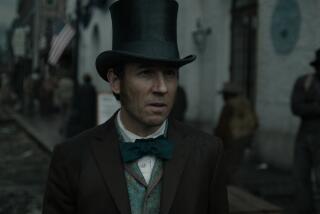Abe Lincoln and the Truth Get Mugged at the Click of a Mouse
- Share via
At St. Joseph, Mo., in the spring of 1861, the young rider for the Pony Express tucked a copy of Abraham Lincoln’s first inaugural address into his saddlebag and began the journey that transmitted the new president’s words to Sacramento, Calif., in a record time of seven days and 17 hours. In little more than a week, the entire country could read of Lincoln’s hope of averting war and his belief that in time, the “mystic chords of memory” would heal the country’s widening divisions.
In our modern world, as I recently discovered to my chagrin, information travels not at the speed of horse and rider but at the speed of light. On March 17, the London Times released a Web version of a story that would appear in the next day’s paper, falsely alleging that Steven Spielberg--who has optioned my unfinished manuscript on Lincoln--and I planned to present Lincoln as a “manic depressive racist” and head of a “dysfunctional” family “who nearly lost the American Civil War.”
Carried via satellite, the story reached Matt Drudge’s Florida headquarters and was placed on his Web site even before the newsprint edition of the London Times had reached the streets. In the next 24 hours, 1.6 million hits were recorded on the Drudge site. The story was picked up by dozens of newspapers and made it to Rush Limbaugh’s Web site, where Spielberg and I were accused of engaging in a left-wing conspiracy to denigrate American heroes in order to enhance the reputation of Bill Clinton. Within hours, the story was being discussed on talk radio and on television, and I was receiving e-mails from Lincoln scholars as far away as Australia, who were understandably concerned by the story’s portrayal of my intentions.
In the initial stage, none of the editors or commentators checked the story with me or with Spielberg. All that mattered was speed. The story was there and had to be published quickly, so that no one would lag behind competitors. A single phone call would have revealed that the story was a total fabrication. Neither Spielberg nor I had ever spoken to the London reporter. The sentiments and words he attributed to me were not simple distortions or words taken out of context. They were thoughts I had never expressed, sentiments I had never felt and were indeed opposite to the conclusions I had reached after five years of research.
When I contacted the reporter, he blamed his errors on “second-level editors” who had mistakenly attributed to me words that others had spoken. He said the paper would issue me an apology and allow me to “correct” the errors with a letter to the editor. But by then, the story had circled the globe.
Even more troubling from a historian’s point of view, the article based its preposterous claim that Lincoln was a racist on a few statements he made in the 1850s in the course of his campaign against Stephen Douglas for an Illinois Senate seat. In reply to Douglas’ charge that he favored complete “Negro equality”--a sentiment that would have meant the end of his political career--Lincoln disclaimed any intention to overturn Illinois laws that prevented blacks from voting or sitting on juries. But then, taking a position well in advance of Northern opinion at the time, he argued that the black man should be entitled “to all the natural rights enumerated in the Declaration of Independence” and that “in the right to eat the bread . . . which his own hand earns, he is my equal and the equal of Judge Douglas and the equal of every living man.”
In his last public address, on April 11, 1865, Lincoln called on his countrymen to confer the right to vote to all black men who had received an education or served in the Union Army. In the audience that evening, a young Southerner, John Wilkes Booth, was outraged by Lincoln’s talk of citizenship for blacks. Booth vowed: “That is the last speech he will ever make.” Three days later at Ford’s Theatre, Booth carried out his pledge.
I have fought all my professional life against the tendency to label people in a derogatory way by juxtaposing their statements from the past against modern sentiments. The false claim that I would follow this hateful practice in my own work is truly wrenching to me. But now, with the consolation provided by the knowledge that this commentary will begin its own electronic journey across the world, I can return to my research, immersing myself once more in an earlier era, when people spent hours each day recording their thoughts and feelings in diaries and letters. For these slower-paced documents, so carefully preserved over time, should allow me to understand the inner feelings of the Lincoln circle more fully than future historians, lacking such letters and diaries, will be able to record the emotions and thoughts of our electronic generation.
More to Read
Only good movies
Get the Indie Focus newsletter, Mark Olsen's weekly guide to the world of cinema.
You may occasionally receive promotional content from the Los Angeles Times.










